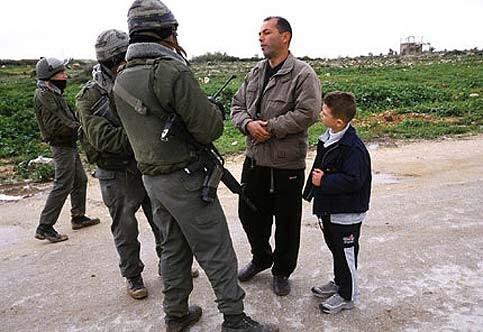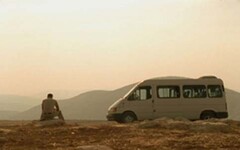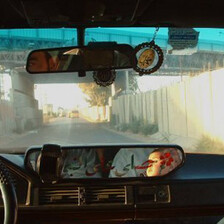The Electronic Intifada 15 October 2004

Israeli soldiers stop a Palestinian father and son in “Checkpoint” (Image: Efrat Shalem)
“When the Palestinians come we put on our show,” says a youthful Israeli soldier manning a checkpoint at Nablus’ Jericho road. This “show,” as it is richly documented in the new Israeli film Checkpoint, serves a seemingly dual purpose. First and foremost, it is intended to remind Palestinians just who is in power; and secondly, it serves as a form of entertainment to the young Israelis whose compulsory military service finds them wasting their time and talents at these roadblocks in the occupied Palestinian territories.
Filmed during 2001-2003, this cinema verité exposé on the subjugation of ordinary Palestinians at Israeli checkpoints doesn’t spend time discussing the historical context of the conflict. Instead, the intent is to show viewers, without much meddling by the voice of the filmmaker Yoav Shamir, the power dynamics enforced at the checkpoints that choke the infrastructure of Palestinian society.
The simplest of activities are made impossible by Israeli soldiers, who are documented in the film as sometimes denying Palestinians movement just because they can. Palestinian men, women, and children - healthy, frail, old, and young - are forced to wait in bitter thunderstorms, snow, and the heat to get to hospitals, schools, funerals, jobs, and their homes.
Because the film focuses on just this one aspect of the conflict - the checkpoints - the full horrors of the Israeli military occupation, like the violence that usually makes the news, aren’t readily apparent. But it vividly demonstrates the banality of the occupation - the waiting, the frustration, the struggle of wills between the Palestinian population and the barely out of high-school Israeli boys who operate the checkpoints - the only Israelis most Palestinians will ever meet.
An annoyed but patient Palestinian man attempts to drive his truck through a checkpoint at Jenin’s southern entrance. He tries negotiating with the Israelis, who tell him that a curfew has been placed on Jenin because “you guys are making trouble.” The Israelis tell the man that he can sleep in his truck that night.
An Arab-Israeli man near Hebron tries returning through the checkpoint he was at a half an hour ago, as he was told earlier he was allowed to do, but finds that the Israelis have changed their mind, for no apparent reason. Responding to the Israeli who says, “I’m just a soldier at a checkpoint,” the young man says, “Okay, but that’s not fair. … If you were in my place, what would you do?”
After the man has finally has driven off, the soldier says to the camera, “Try to make me look good, not like the bad guy.” The filmmaker replies, “How can I?” The soldier answers, “Blame it on the higher-ups.”
Israeli border police working in Palestinian Bethlehem brag that they “break” the Palestinians by humiliating them at the checkpoints. To clarify any confusion, one of the officers says, “What do I mean by ‘break them?” [I mean] make them suffer. … Let the world know. This is the Bethlehem Border police.” The officer is soon distracted by an attractive 15-year-old Palestinian girl across the road, whom he harasses despite her polite efforts to show she isn’t interested.
Perhaps feeling safe because there is a filmmaker to provide witness to the Israeli soldiers’ actions, a young man at a checkpoint near Nablus gets in a shouting match with a soldier, who promptly detains him (one wonders what the soldiers do when there isn’t a camera around). In the same scene, a trembling older man in a keffiyeh holds out his bags to the soldiers and explains in broken English, “Food for my wife for Christmas tomorrow. Meat for my family,” and begins to tear up when the soldiers deny him entrance despite his declaration of friendship to the young Israelis.
The audience experiences with the Palestinians at the checkpoints the rage that bubbles under when a jaded Israeli, armed to the teeth, doesn’t let a Palestinian mother accompany her crying grade-school aged sons through a checkpoint at Khan Younis. Viewers nearly get goosebumps as a Palestinian man shivers and rubs his hands together for warmth during a winter thunderstorm at a checkpoint near Nablus.
We celebrate the small victory the Palestinians achieve when they storm through a checkpoint at Ramallah, led by a middle-aged Palestinian woman who yells to the Israelis that they can shoot her if they want, undeterred by the warning shots they fire into the air. As one soldier shouts that he’ll “break her bones,” a Palestinian shouts, “Is this the freedom you promised us?”
It is clear in the film that the Israelis have the upper hand in this conflict. Watching nineteen-year-old Israeli soldiers decide when and where and how Palestinians must go about their daily activities causes American and Israeli criticisms that Palestinian leadership must “do more” to improve the situation of the Palestinians to ring hollow. Seeing Palestinian kids having to empty out of a schoolbus at the behest of gun-toting Israeli soldiers causes little wonder that some of them might grow up to become militant. The children are fresh-faced and goofing off for the camera now, but how long can they go, passing tanks on their way to school and watching their parents be humiliated at checkpoints, before they attempt to wrest back their dignity and self-determination from the hands of their occupiers?
In a not particularly optimistic but entirely poignant conclusion, a group of young Palestinian men sit in the dark at a checkpoint, in the pouring rain and thunder. One of the men protests that he has been sitting there for ten hours, and when he asks when he’ll be able to pass through, the Israeli soldiers keep on telling him “soon.” As he is explaining this to his peers also waiting at the checkpoint, the video goes black, and the credits begin to roll as the men continue to speak in Arabic. It’s an apt ending - the Palestinians have been waiting for justice for decades now, and all they are hearing from the rest of the world is, “soon.”
Maureen Clare Murphy is Arts, Music, and Culture Editor for The Electronic Intifada





